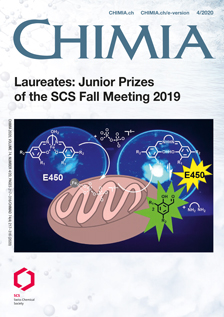Modular Chiral N-Heterocyclic Carbene Ligands for the Nickel-Catalyzed Enantioselective C–H Functionalization of Heterocycles
DOI:
https://doi.org/10.2533/chimia.2020.278PMID:
32331547Keywords:
Asymmetric catalysis, Carbenes, C–h functionalization, Nhc, NickelAbstract
N-Heterocyclic carbenes (NHCs) are the ligands of choice in a large variety of transformations entailing different transition metals. However, the number and variety of chiral NHCs suitable as stereo-controlling ligands in asymmetric catalysis remains limited. Herein we highlight the introduction of a modular NHC ligand family, consisting of a chiral version of the widely used IPr ligand. These chiral NHC ligands were applied in the nickel-catalyzed enantioselective C–H functionalization of N-heterocycles. Nickel-NHC catalysis unlocked the stereoselective C–H annulation of 2- and 4-pyridones, delivering fused bicyclic compounds found in many biologically active compounds. Applying a bulky, yet flexible ligand scaffold enabled the highly enantioselective C–H functionalization of pyridones under mild conditions. The introduction of a bulky chiral SIPr analogue enabled the nickel-catalyzed enantioselective C–H functionalization of indoles, yielding valuable tetrahydropyridoindoles. Additionally, pyrrolopyridines, pyrrolopyrimidines and pyrroles were efficiently functionalized, delivering chiral annulated azoles.Downloads
Published
2020-04-29
Issue
Section
Scientific Articles
License
Copyright (c) 2020 Johannes Diesel, Nicolai Cramer

This work is licensed under a Creative Commons Attribution-NonCommercial 4.0 International License.
How to Cite
[1]
J. Diesel, N. Cramer, Chimia 2020, 74, 278, DOI: 10.2533/chimia.2020.278.







